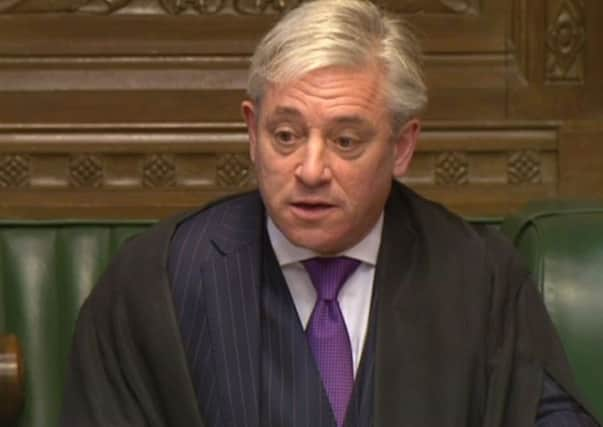YP Comment: Why the Bercow ban was wrong. Speaker lacks statesmanship


By using the authority of the Speaker’s chair to express a personal view in a partisan way in which he repeatedly turned to the Opposition benches for support, he has compromised his own authority, been effectively rebuffed by the governing party and left himself open to the charge of hypocrisy.
This is the same Mr Bercow who was content to welcome Xi Jinping, the Chinese president, to Parliament in 2015 despite longstanding concerns about human rights abuses in China. If he felt his views took precedence over the Queen’s invitation to President Trump, he should have resigned and spoken from the backbenches.
Advertisement
Hide AdAdvertisement
Hide AdGiven the turbulent start to the Trump presidency, there is understandable unease at the speed in which he has been afforded a state visit by the Queen, presumably at the behest of Theresa May as she looks to put in place a trans-Atlantic trade deal to coincide with Brexit.
Yet, if Mr Bercow was concerned that Parliament would be brought into disrepute, he would have been advised to express his disquiet through official channels before taking an unilateral decision without even having the courtesy to consult his deputies or his Lords counterpart Norman Fowler, who has now called for the protocols governing the issuing of such invitations to be reviewed.
The consequence is that the Speaker becomes the central focus of the debate and faces the indignity of being asked by Conservative MPs whether they could have “full confidence” in his “impartiality” when Westminster had a golden opportunity to provide an object lesson in statesmanship to President Trump. Mr Bercow should think before he speaks in future. After all, Yorkshire’s very own Betty Boothroyd never allowed herself to become embroiled in such controversy during her Speakership.
Care conundrum
SAJID Javid’s complacency over social care was self-evident when the Communities Secretary described the current state of affairs as “very challenging” rather than a crisis. The evidence suggests otherwise. Tory controlled Surrey County Council contemplated raising taxes by 15 per cent, Sheffield City Council is joining other town halls and endorsing the three per cent hike proposed in the Autumn Statement and the nation is reeling from the harrowing case of a helpless dementia sufferer forced to spend six months in hospital because there were no care home places available in the community.
Advertisement
Hide AdAdvertisement
Hide AdIt’s not just the treatment for older people that has left the NHS facing intolerable pressures this winter – half of local authorities do not have sufficient childcare places when plans to double the free hours available to pre-schoolers comes into force, later this year. And this in a country where the tax burden is set to reach a 30-year high according to the Institute of Fiscal Studies. If Mr Javid doesn’t think Britain is facing a care crisis, he’s even more out of touch than his cavalier demeanour would suggest.
A day after Mr Javid said there was no excuse for NHS hospitals not working with social care sector to assist the elderly, a damning National Audit Office report warns that plans to integrate these services by 2020 are behind schedule and not achieving the intended benefits. Not only did the Better Care Fund fail to realise projected savings of £511m, but emergency admissions to hospital rose by 87,000 when they were forecast to reduce by 106,000. Either Mr Javid accepts responsibility or he finds alternative employment. It’s his call.
A breed apart
HORSE racing’s champion apprentice in 2009 when attached to Richard Fahey’s Malton stables, jockey Freddy Tylicki’s riding career couldn’t have come to a more abrupt end when a four-horse pile-up last October left him paralysed from his waist down.
Like all jockeys, he knew the risks. And like all riders who have had the misfortune to suffer life-changing injuries, it’s their courage and positivity in the face of adversity which helps to explain why these very special sporting competitors are a breed apart.
Advertisement
Hide AdAdvertisement
Hide Ad“You’ve just got to do the best you can out of the situation,” said the jockey in his first major interview since the fateful fall. They are words that can only inspire, and give strength, to those sportsmen, accident victims or members of the Armed Forces whose lives are torn apart like this.